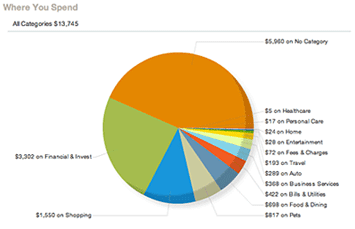 Self-awareness is what separates man from the ape. And high-quality self-knowledge is what separates the successful entrepreneur from the failed one. What do you spend most of your time on? What are your weaknesses? Who do you talk to the least that provides good advice the most often? The more we know about ourselves, the better we’re able to spend our time, and the easier it is to identify the areas where improvement will have the biggest effect. This is more than learning from our mistakes (though I’ve been doing that, too); it’s helping ourselves avoid errors and make the most of our strengths.
Self-awareness is what separates man from the ape. And high-quality self-knowledge is what separates the successful entrepreneur from the failed one. What do you spend most of your time on? What are your weaknesses? Who do you talk to the least that provides good advice the most often? The more we know about ourselves, the better we’re able to spend our time, and the easier it is to identify the areas where improvement will have the biggest effect. This is more than learning from our mistakes (though I’ve been doing that, too); it’s helping ourselves avoid errors and make the most of our strengths.
The downside is, it takes a lot of time to evaluate yourself, and a more heightened awareness of all the actions we take every day than most of us really have. For some things, it requires keeping track of actions over the course of weeks or more. It takes a ton of mental energy, or making the extra effort to setup a system to track things for you, to get this done. It’s the information overload of life.
And that’s what technology is for.
 After attempting to determine which of the nearly 700 feeds I’m subscribed to I should keep, based on what my sketchy memory tells me about how often each of them has provided any kind of value, I’ve decided to finally move on from Bloglines as a feedreader. I’m hammering on another link in the chain of Google’s Information Ecosystem and switching to Google Reader. It doesn’t have all the analytics I’d like (# of links I click by feed, for instance), but its Trends feature at least shows me which feeds I’m actually reading (and some other nifty data). Google Reader isn’t the only tool that’s enlightening me about my habits…
After attempting to determine which of the nearly 700 feeds I’m subscribed to I should keep, based on what my sketchy memory tells me about how often each of them has provided any kind of value, I’ve decided to finally move on from Bloglines as a feedreader. I’m hammering on another link in the chain of Google’s Information Ecosystem and switching to Google Reader. It doesn’t have all the analytics I’d like (# of links I click by feed, for instance), but its Trends feature at least shows me which feeds I’m actually reading (and some other nifty data). Google Reader isn’t the only tool that’s enlightening me about my habits…
 RescueTime is something I decided to give a try this year, and it’s been tremendously helpful in showing me where I spend my time on the PC. Mint is to my money what RescueTime is to my time. And one of my fondest wishes is for GMail to get some kind of Xobni or ClearContext-like functionality that will show me who my most frequent contacts and conversation subjects are. The best thing about these apps is that they don’t require any effort on my part past installing them. No data entry, no tagging (though I can, if I want to improve the already very good results), they *track my naturally occurring actions without me having to think about it*. That means I can spend my time on gaining insight, not measuring usage.
RescueTime is something I decided to give a try this year, and it’s been tremendously helpful in showing me where I spend my time on the PC. Mint is to my money what RescueTime is to my time. And one of my fondest wishes is for GMail to get some kind of Xobni or ClearContext-like functionality that will show me who my most frequent contacts and conversation subjects are. The best thing about these apps is that they don’t require any effort on my part past installing them. No data entry, no tagging (though I can, if I want to improve the already very good results), they *track my naturally occurring actions without me having to think about it*. That means I can spend my time on gaining insight, not measuring usage.
If you frequently find yourself wanting to get more out of what you have, whether it’s an hour from your day or a dollar from your wallet, take 5 minutes to sign up for the apps above. And let me know if you find more like them!